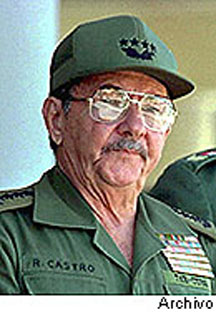HAVANA, (Reuters) – President Raul Castro’s admission at a Communist Party congress that Cuba lacks successors for its aging leaders underlined the old guard’s inability to give up power and its struggle to preserve the Revolution.
Addressing the congress that ended on Tuesday, Castro gave a litany of reasons for the failure to find new faces and vowed to look for candidates from groups that have been neglected before, including non-members of the party.
The leadership issue is a serious problem for the 79-year-old president, who wants to ensure the survival of Cuban communism and defy opponents’ predictions it would die with the Castros.

With that in mind, Castro, 79, has embarked on an ambitious reform of Cuba’s stagnant economy, but he says it will take five years to complete. He formally took over the Cuban presidency from his brother Fidel Castro, 84, in 2008.
The sight of former leader Fidel Castro being helped to his chair at the close of the congress reinforced the fact that time is growing short for the men who have run the country since the 1959 Revolution.
He was also a reminder to current leaders of the dangers of staying in power too long, said security guard Cecilio Guerra.
“The older people loved him for what he did after the triumph of the revolution, but we’ve been in the same situation for so long that many came to blame him for it,” he said.
Cuba’s top leaders are mostly in their 70s and 80s, but they have often given public assurances that younger people were being groomed to take over.
Some observers thought the congress would provide a glimpse of Cuba’s future rulers, but they were disappointed when the status quo prevailed, embodied by the selection of Raul Castro as the party’s first secretary and his longtime ally Jose Machado Ventura, 80, as number two.
Along with them were a host of familiar faces picked for the party’s powerful 15-member Political Bureau.
“It was what I expected, but it wasn’t what I hoped for. Even the leaders know we need new people with new ideas, and we need them now,” said flower peddler Isabela, who did not give her full name.
Dropped from both the Politburo and Central Committee was Culture Minister Abel Prieto, a relative youngster at age 60.
In a speech, Castro said the party had been neglectful of getting new blood at the top, which he pledged to change.
“Today, we are faced with the consequences of not having a reserve of well-trained replacements with sufficient expertise and maturity to undertake the new and complex leadership responsibilities in the party, state and government,” Castro soberly told his fellow communists.
NO STRAYING FROM THE PATH
This was not an easy task, he said. “Although we kept on trying to promote young people to senior positions, life proved that we did not always make the best choice.”
The wrong choices included several who strayed from the strict ideological path hewn by the Castro brothers.
There is speculation Prieto may have been one of these, and the same was likely the case for former Vice President Carlos Lage and former Foreign Minister Felipe Perez Roque.
The latter two, both years younger than their ruling contemporaries, were riding high, often cited as successors to the Castros, when suddenly they were fired in 2009.
They were forced to issue public apologies for what Fidel Castro described as succumbing to “the honey of power.”
It was never revealed officially why they were dismissed, but reports surfaced that they had been secretly recorded making remarks about “dinosaur” colleagues and suggesting that, once in charge, they would make changes to the Cuban system.
Therein lies a big reason Cuba has a paucity of younger leaders, said Christopher Sabatini, senior policy director for the Americas Society in New York.
The current rulers forged their beliefs in the fires of revolution and half a century of resisting ideological foe the United States. They have viewed with mistrust those who did not pass through the same crucible.
“Fidel, Raul and other ‘historicos’ carry with them the spirit, vision and the dogma of the revolution. That sense of ownership over a movement, a historical moment, doesn’t allow for competing interpretations or the cultivation of new leaders,” Sabatini said.
“For this reason, charismatic movements rarely outlive their founder,” he added.




